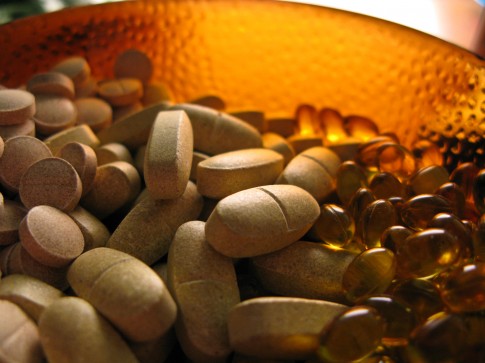As a nation we thrive on quick fixes, so it’s not surprising that more than half of all Americans take some type of dietary supplement — creating a staggering $30 BILLION industry.
And here’s the kicker: supplements are basically doing nothing to make us healthier. Supplement users do not live longer, or die of dreadful illnesses at a lesser rate, than non-supplement users with similar lifestyles. In fact, supplement use may be doing us harm.
The thousands of dietary supplements on the market — including multi-vitamins, individual mega-doses of vitamins and minerals, ayurvedic remedies, herbals, protein powders, etc. — will not keep you from getting wrinkles or cancer. And the most common supplement of them all, a daily multi-vitamin, is not an insurance policy. While people who take a daily multi-vitamin may be healthier than those who don’t, the multi-vitamin is not the reason: it turns out that most multi-vitamin users already have a more well-balanced diet, and are more physically active, than those who don’t. These healthy people don’t need extra vitamins and minerals; by taking them, they simply end up with what we call “expensive urine.”
What’s more, taking supplements cannot replace the naturally occurring combination of nutritious factors found in FOOD. In fact, if you rely too heavily on supplements, you miss out on a ton of nutrition. Synthesized pills can never substitute for whole foods such as vegetables, fruits, and whole grains. Food also has a multitude of other non-essential nutrients that offer health benefits such as flavonoids, carotenoids, FIBER, and many other substances that supplements just don’t contain — and that likely work to prevent chronic disease. These nutrients come in foods in natural combinations, many of which we’re still discovering. A pill simply can’t do that. So, to take just one example, skip the fish oil; eat FISH instead.
That’s how supplements are not helping us. But how are they potentially harming us? Watch for a supplement’s claim to fame: this one increases energy, that one enhances performance. Lose weight! Reduce body fat! Relieve symptoms of fatigue and stress! And, of course, the holy grail: take a pill and you can eliminate signs of aging! Oh yes, these supplements are “all-natural.” How, exactly, do we know that these supplements work? We don’t. There is no evidence that most supplements have any of the positive effects their marketers tout — and yet it’s perfectly legal for their marketers to make such pronouncements. Supplement manufacturers can say anything they want about their product, as long as they don’t claim to prevent a specific disease.
Here’s the stark reality. The Food and Drug Administration (FDA) treats dietary supplements under the general umbrella of “foods,” just like it would an apple — even though supplements clearly are not food. So, as “food,” supplements aren’t as tightly regulated as drugs and medications are, EVEN THOUGH many users treat supplements as a cure for an ailment — i.e., a drug. The FDA is not empowered to closely monitor a supplement’s contents unless there’s evidence that the supplement is dangerous — and even then, the FDA simply doesn’t have the sheer people-power to monitor all supplements on the market. So what slips through the cracks? False labels (for instance, a bottle of vitamin D labeled as 1000 IU per pill might instead contain 10,000 IU per pill). And contamination — YES, CONTAMINATION — with substances such as lead, mercury, anabolic steroids, etc., leading to serious side-effects and sometimes even death.
Here’s what you should do. Focus on a healthy well-balanced diet and only take a supplement if you have a diagnosed clinical deficiency. And if you must take a supplement, make sure that you buy it from a reputable manufacturer — and try to buy only supplements bearing the United States Pharmacopeia (USP) seal, which indicates random off-the-shelf testing has been conducted to insure integrity, purity, and safe manufacturing. Just don’t be surprised if you don’t find this seal often; as the New York Times recently reported, fewer than 1 percent of the 55,000 supplements on the market bear this label. So buyer beware. And remember that even with a seal, no pill is a magic bullet.







Leave a Reply
You must be logged in to post a comment.